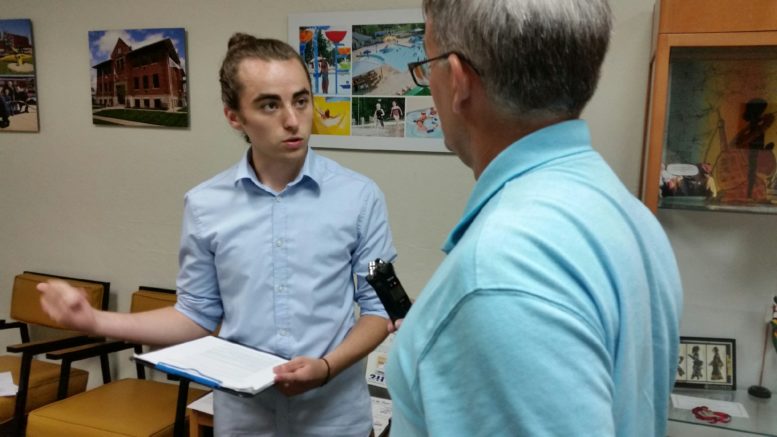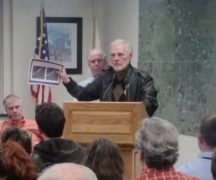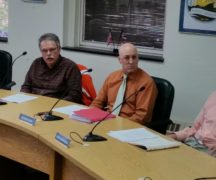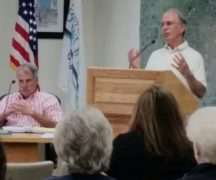By JAN LARSON McLAUGHLIN
BG Independent News
On the eve of the Tuesday’ election, proponents of the Bowling Green charter amendment made one last big pitch for the proposal to City Council Monday.
And city officials, whose efforts had been questioned and criticized by the proponents for the past year, ended up thanking the college students behind the proposal for their passion and sincerity.
The evening ended with a handshake between Mayor Dick Edwards and Brad Holmes, one of driving forces behind the charter amendment. On Tuesday, Bowling Green voters will determine whether or not the anti-pipeline amendment becomes a part of the city charter.
Three BGSU students stood up Monday to defend the charter amendment. Alex Bishop, who is originally from Mansfield, said the Rover pipeline runs about a half mile from her home and spilled thousands of gallons of hazardous material that destroyed a wetlands. She doesn’t want to see something similar happen near her “second home” of BGSU.
“This issue is really important to me,” Bishop said. “I wanted a chance to come here and talk about it.”
Holmes said the charter amendment proposal had to jump through several hoops to even get on the ballot. “I’m just very happy we made it this far,” he said.
Though the wording of the charter amendment has been criticized, the purpose of the proposal is to empower city officials and the community to reject plans for a pipeline that could be potentially dangerous, he said. “We’re very confident, if passed,” the wording would help the city put a stop to a pipeline.
With the power of eminent domain, “communities are at the negative receiving end” of pipeline projects, Holmes said.
Another BGSU student, Ross Martin took the podium next and questioned the value of Nexus’ offer to pay the city about $80,000 to go across city land located in Middleton Township near the Bowling Green water treatment plant reservoir.
Even if that amount were $1 million, divided among the city’s 30,000 residents, that would be like saying “we would like to endanger your water for $33.33,” Martin said.
Martin said fighting for health and safety, and inspiring others to do the same, are “noble” efforts. “We have that opportunity to inspire others,” he said.
After the students completed their comments, Mayor Dick Edwards offered an impromptu response.
“I understand your passion. I understand it totally,” said Edwards, who has worked at several universities.
The mayor also agreed that Holmes was “absolutely correct” in his comments when he talked about municipalities being virtually powerless against pipelines.
The cities of Green and Oberlin are still battling Nexus, but their communities are actually being cut by the pipeline, Edwards said. Waterville’s charter amendment empowers that city to refuse a construction permit. But that will likely be overruled.
In Bowling Green’s case, the pipeline is not coming into the city. It is crossing a 28-acre parcel the city owns in Middleton Township, close to the city’s reservoir.
“We’re trying to do everything we possibly can,” the mayor said. “Obviously we don’t want what has happened in southeast Ohio to happen here.”
Edwards has received guarantees from the Ohio EPA and FERC that those organizations will monitor the pipeline construction near the water plant, especially at the river crossing.
“I just hope that you understand a lot of us have taken this very seriously,” the mayor said to the students. “We’ve heard you time and again.”
Edwards said he knows of no community that has been successful in stopping a pipeline, unless it is going through the city itself.
“All we can do is hope all the safety precautions are taken,” he said.
Council member Sandy Rowland pointed out that fines issued against pipeline companies mean nothing, since their pockets are so deep.
Though the charter amendment proponents have at times been a thorn in the sides of city officials, Council President Mike Aspacher praised their efforts.
“Thank you for your impassionate comments and all your efforts on this matter,” Aspacher said. “Certainly none of us wished for this to pass close to our community.”
Council member John Zanfardino thanked the mayor for his work getting guarantees from the EPA and FERC, and Holmes and Lisa Kochheiser for their efforts. “I really do appreciate the passion you guys bring to this.” Without their pushing, council may not have denied an easement to Nexus last year, he said.
Before leaving the podium, the mayor emphasized the city’s commitment to the environment through use of hydro power, being the first Ohio city to have wind turbines, and having the largest solar field in the state.
“We are at 41 percent sustainability right now,” Edwards said. “Other communities aren’t even close to us.”
The city should be proud of that achievement, and plans to keep moving forward with renewable energy, he said.





